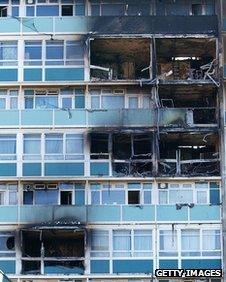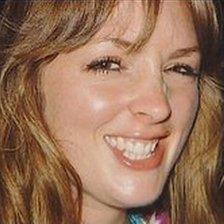No fire checks for tower blocks despite Lakanal fire
- Published

Three adults and three children died in the fire in 2009
At least 21 London tower blocks rated as a high fire risk by local councils were not visited by firefighters last year - despite flawed visits being a factor in the fatal Lakanal House fire.
Familiarisation visits are carried out by firefighters on high risk blocks so firefighters can learn the layout.
The data was not used properly at Lakanal House, where six people died.
The London Fire Brigade (LFB) said its judgement of what is high risk differed from that of council inspectors.
A three-week-old baby was among the victims of the blaze at Lakanal House in Camberwell in July 2009.
The inquest into the deaths found that information gathered by the LFB during prior familiarisation visits to the tower was not passed on to firefighters at the scene.
'Critical decisions'
This meant they did not know where emergency exits were and may have incorrectly advised those who died to stay in their flats.
Coroner Frances Kirkham wrote in a letter to the LFB: "Gathering of operational knowledge has little value unless it can be stored, disseminated, accessed and updated when most needed at incidents when the use can save valuable time and inform critical command decisions."
Freedom of Information requests sent by BBC London have now revealed that many tower blocks rated as high risk by local authorities received no visits at all from the LFB last year.
The BBC does not have a list of which tower blocks the LFB itself rates as high risk.
Of London's 114 tower blocks rated high risk by local councils, just four received the four annual familiarisation visits the LFB's own guidelines say the riskiest buildings should have.
The research showed 21 of the buildings received no visits whatsoever.
According to the LFB's Freedom of Information response, three have not had any familiarisation visits since 2008.
LFB regulations say that even the lowest-risk buildings should be visited every one to two years.
Harriet Harman, MP for Camberwell and Peckham, described it as "totally unsatisfactory".
She went on: "It is the LFB's responsibility to do these visits and it seems they are just not doing them.

Catherine Hickman was one of those killed
"And clearly nobody is checking up on them to make sure they are taking place.
"The whole thing needs looking into and I will be raising it with both the London Fire Authority and the government because there are questions that need to be answered."
For 16 of the high risk tower blocks on the council list, the LFB was unable to say whether they had been visited at all, because no data was recorded in fire stations' logs.
Fire safety expert and chartered surveyor Arnold Tarling said the lack of visits meant if a fire did occur at one of the buildings firefighters would be "going down there blind".
He added: "It is entirely unacceptable.
'Mobile terminal'
"Over time buildings change and I would expect that firefighters carry out at least one inspection per year."
A spokesman for the Department of Communities and Local Government said: "Our guidance on identifying and visiting high risk buildings is clear.
"London Fire Brigade and London authorities need to work together to ensure that this guidance is adhered to and necessary visits take place."
The LFB said that since the Lakanal fire it had now put in place mobile computers on fire engines which would ensure familiarisation visit data was available on the scene of fires.
Responding to the BBC's investigation, the Fire Commissioner Ron Dobson said: "The way in which a local authority would [judge] a block as being high risk might be different to the way a fire service does it.
"They might decide that given the layout of the building, the height of the building, the way it's designed, it's sufficient to record that information and put it on a mobile data terminal - and not necessary to go back and visit very frequently."
He continued: "I'm pleased there's only a very small minority that according to your information didn't have any visits.
"But my requirement would be that there are no buildings which haven't had any visits and I will be picking up on those stations and making sure they're done as soon as possible."
- Published28 March 2013
- Published28 March 2013
- Published12 February 2013